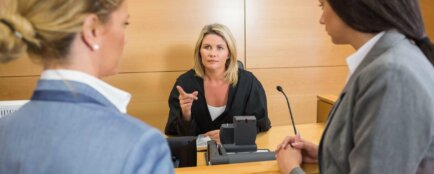A court decision that regulates certain legal relations and creates new rights and obligations is always based on a combination of legal and factual findings. What matters to the judge is the extent to which the parties to the trial agree or disagree on their claims. The breadth of proof of their claims then varies accordingly.
The litigants are subject to what is known as the burden of proof, and their main task is therefore to find ways to support their claims and to offer evidence. It is then for the judge to assess which of the proposed evidence is crucial to his objective findings and to have that evidence admitted. In taking evidence, the judge considers not only the credibility of the evidence but also its relevance to the subject matter of the case. In doing so, he shall aim, in particular, at proving facts on which the parties disagree. If both parties agree with a particular statement, there is no need to prove it.
Example: if the subject of the dispute is an (allegedly) invalid termination of employment by the employer, and both parties agree that they entered into an employment contract three years ago, then there is no need to prove this fact and the court focuses mainly on the termination itself.
Tip for article
We have discussed the principles and rules of evidence in civil court proceedings in our article.
Are you solving a similar problem?
Are you going to court?
Your success depends primarily on a brilliantly written proposal and well-designed evidence. We can help you with both. We will conduct a careful analysis of the case and take care of preparing a pre-suit notice, a statement of claim, an appeal or straight to representing you in court where we will vigorously enforce your rights.
I want to get legal help
- When you order, you know what you will get and how much it will cost.
- We handle everything online or in person at one of our 6 offices.
- We handle 8 out of 10 requests within 2 working days.
- We have specialists for every field of law.
In general, anything that can be used as evidence to prove my claim, or that can be used by the judge to determine the state of the case. In the context of evidence, the parties must take care to properly identify and present evidence, which includes not only written documents but also electronic communications or witness statements. Evidence and means of proof are regulated by the Code of Civil Procedure, which gives as examples the examination of parties and witnesses, reports and statements of authorities and legal persons, notarial or executor’s records or other documents, expert reports and inspections. This list is not exhaustive and may be extended as necessary. However, it is a list of the typical means of evidence most commonly encountered in court. Let us now examine them in more detail.
Witness testimony
This is the testimony of a person who is not one of the parties to the proceedings. The court is usually asked about what he or she experienced, saw or heard.
A witness can be anyone who is able to perceive certain things and then communicate them to the court. For example, a child may be a witness, provided that what he or she is asked about is within his or her capacity to reason. The questioning of a child, however, is generally different from that of an ordinary witness. It should exclude the public in order to protect the rights of the child. As a rule, the judge tries to create a more civil atmosphere; he or she may remove his or her gown and talk with the child either together at the same table in the courtroom or even in the office. There is therefore no need to worry that the experience will be in any way stressful for the child.
If you are called as a witness by the court to testify about a particular event or fact, it is your duty to do so as well. However, there is a situation where you may refuse to give evidence if doing so could result in criminal prosecution of yourself or those close to you.
However, if you do agree to give a statement, you must tell the truth or you may be committing the offence of perjury. This is to be distinguished from situations where you are bound by a duty of confidentiality.
The duty of confidentiality applies to a number of situations and professions – whether they are business, government, medical or even confessional. Lawyers and judges are also bound by the duty of confidentiality in matters relating to the exercise of their profession. In matters relating to the secrecy in question, no questioning can be conducted unless the person concerned is exempted from the obligation of confidentiality.
A witness shall be questioned primarily by the President or, where appropriate, by the members of the Chamber. The parties and their representatives may also ask questions with the consent of the judge. Questions should be relevant and appropriate. Suggestive and capricious questions shall be deemed inadmissible.
Example: Capricious questions are essentially trick questions or cunning questions which, for example, involve a fact not yet confirmed. For example, “Did Mr. Dvorak sign the contract with a fountain or ballpoint pen?” in a situation where it is not confirmed whether Mr. Dvorak signed any contract at all. A suggestive question is instructive – for example – “Was Mrs. King wearing a black dress at that moment?” Instead of “What color were Mrs. King’s clothes?”
The witness’s statement is recorded in the minutes of the hearing. It must not be distorted or altered in any way.
The expert’s report
Experts come to the table when their expertise is needed to prove certain facts. An expert’s report is usually drawn up in writing, but the expert may also be called upon to clarify it and answer supplementary questions. Unlike a witness, an expert does not testify about what he or she has experienced, but about what he or she has learned from his or her expertise and what conclusions he or she has reached.
In the order appointing the expert, the court should set out the specific task of the expert, preferably by means of clearly formulated questions aimed at clarifying the facts at issue.
Experts are usually selected from a list of court experts. Only exceptionally, if there is no expert registered for a given field, another person with the necessary training and expertise may be approached.
In civil proceedings, there are situations where expert evidence is necessary. These are
- legal capacity proceedings,
- proceedings to declare the admissibility of taking or holding in a health care institution,
- enforcement of a judgment by sale of movable property,
- enforcement by sale of immovable property,
- enforcement by division of joint property.
The insolvency administrator may appoint an expert to assess the value of the business.
An expert also has the right to refuse to give an expert report for fear of criminal prosecution to which he would expose himself or persons close to him if he gave the report. However, if, on the other hand, the expert gives a false, grossly distorted or incomplete expert report, he or she may be prosecuted for the offence of false expert report.
An expert report should contain three parts:
- The finding, which describes the assignment from the court and the relevant facts that were considered.
- The opinion, which is the actual expert assessment of the facts and any answers to questions formulated by the court.
- The expert’s endorsement, which includes the designation of the list in which the expert is registered and the field in which he or she is permitted to give an opinion.
The judge evaluates the expert report like any other evidence, but it is not for him to question the expert’s conclusions as to their correctness.
Evidence in electronic form
Nowadays, of course, a record of our electronic communications can also serve as evidence. Not only e-mail, but also conversations in chat rooms, Facebook Messenger, Whatsapp, text messages, recordings in Basecamp or other shared environments. However, it goes without saying that the evidence presented (email, chat log) can always be challenged by other evidence. This can be an expert opinion, a witness statement, practically anything. It is up to the judge to decide what is more credible. However, it is best to have a written contract instead of an email, it is much harder to dispute. It is also advisable to keep metadata with the email to make it more conclusive. We also recommend using email as a confirmation of the agreement on the phone, i.e. just write ex post what the call was about and what you agreed.
Electronic evidence, such as emails or text messages, can be a valuable tool in court proceedings. When giving evidence, it is important to remember that all evidence can be challenged if it is not sufficiently corroborated by other evidence.
Tip for article
Tip: If you are interested in more detail about the role of an expert witness in court, you can read our article on this topic.
Confirmation or expert opinion
These are documents in which the competent authority certifies certain facts, the expert opinion of which does not belong to the court.
Documentary evidence
Documents are among the most common and also the most reliable evidence in civil proceedings, particularly in commercial and employment matters. Their form and content are given and are unchanging, which may not necessarily be the case, for example, with witness statements.
Documents are most often produced with the application itself or with the statement of defence. In practice, these are usually copies which are subsequently supplemented by the original at the oral hearing. If the party itself does not have the document but is aware of it and identifies it as evidence, the court may request it from the authority, legal entity or natural person concerned.
Documents are divided into
- public – issued by courts or public authorities – these may be judgments, certificates, notarial records, etc. There is a presumption of truth, i.e. the fact that the facts stated on them are taken as fact. If any of the parties denies their authenticity or veracity, it is up to them to prove it.
- private – this need not be a private document in the strict sense (i.e. e.g. a letter) but essentially all documents that are not public – including contracts, shares etc. If either party disputes the authenticity and accuracy, then it is instead up to the party who produced the evidence to attest to its authenticity.
The court shall place the documents obtained on the file for inspection by the parties to the proceedings. The actual taking of evidence by document takes place at the hearing, when the President of the Chamber either reads the document in its entirety or announces its contents.
Inspection
Its object may be any thing (movable or immovable) or a human body. It is one of the most reliable means of evidence, but its disadvantage is that its use in civil proceedings is lower (compared to criminal proceedings, for example, where it tends to be the rule). The object of the evidence must be a fact that can be perceived by the senses. It is appropriate to use this evidence, for example, to establish the extent of damage to property (damage to a car, an original painting or real estate).
Inspection may be carried out directly at the court hearing if the nature and size of the item in question permits it. Otherwise, it must be carried out on the spot and all the parties to the proceedings must be invited to attend, or other persons such as experts, etc.
Tip for article
Tip: We have described the course and process of the criminal proceedings in more detail in our article.
Interview of the party to the proceedings
This evidence is used in a rather supportive manner. Of course, the parties to the proceedings express themselves in various ways and may be questioned in the course of the proceedings, but in such cases it is not an interrogation as such.
The corroboration of this evidence is due to the fact that its testimonial value is highly questionable. It is natural that a party has an eminent interest in the proceedings and their outcome and is not impartial, which greatly reduces their credibility.
The court may order evidence by examination of the parties only if the fact to be proved cannot be proved otherwise. The party to be heard should agree to be heard (this condition does not apply, however, in uncontested proceedings and proceedings concerning divorce or civil partnership).
In general, proving a party’s allegations is crucial to the success of the case. Proving this can be challenging if the evidence is not sufficiently convincing or unequivocal, which can affect the outcome of the proceedings.
Summary
In civil court proceedings, various means of evidence are used to help prove the parties’ claims. Common means of evidence include written documents such as contracts, invoices or emails, but also witness statements, expert reports and electronic evidence (such as SMS and chat messages). Other means of evidence include certificates from professional bodies or statements that certify certain facts. All evidence must be properly identified and presented to the court, which assesses its credibility and relevance. It is also important to secure electronic evidence that may be challenged by other evidence, such as witness testimony or expert testimony.




